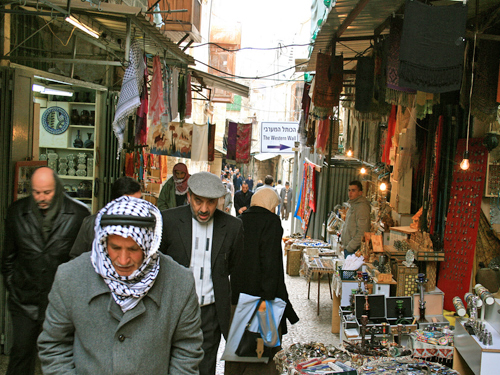Australia/Israel Review
Scribblings: Judaising Jerusalem?
Dec 20, 2011 | Tzvi Fleischer

Tzvi Fleischer
Both Palestinian groups and pro-Palestinian Non-Government Organisations (NGOs) often accuse Israel of seeking to “Judaise” Jerusalem. For instance, following their admission to the UN cultural organisation UNESCO in October, one of the things the Palestinian Authority said they wanted to do was sue Israel in international forums for supposedly “systematically destroying and forging Arab and Islamic culture in Jerusalem.” Similarly, at a controversial rally in Cairo on November 25 at which there was also recitation of a hadith [saying attributed to the Prophet Muhammad] about killing all Jews, Sheikh Dr. Ahmed al-Tayeb, the head of al-Azhar University, proclaimed, “we shall not allow the Zionists to Judaise al-Quds (Jerusalem).”
It’s a somewhat strange charge because, according to the best Ottoman-era statistics available, Jerusalem has been a majority Jewish city since at least 1895, and likely well before that. Furthermore, Jews constituted a plurality in the then-religiously divided city since at least 1844.
Some of the claims about “Judaising Jerusalem” are clearly simply code words for an ahistorical and exclusivist claim that Jerusalem is properly a Muslim and Arab city in which Jews have absolutely no rights unless the rightful Muslim owners deign to let them live there as second class citizens. This is clearly the case at the Cairo rally, where it was insisted that Jerusalem is rightfully a “Muslim city” and there were open calls for its military conquest.
A slightly more sophisticated version of the claim usually comes from NGOs and involves allegations that Israel is seeking to squeeze out the Arab inhabitants of the city as matter of policy. To support such versions of the “Judaisation” complaint, the following policies are usually cited: the building of Jewish neighbourhoods in eastern Jerusalem, supposedly discriminatory building and planning regulations, demolition of illegally-built homes; and the legal fact that Arab residents of Jerusalem who are not citizens of Israel can sometimes lose their right to residency if they live elsewhere for extended periods. Even the newly built (and I can say as a former inhabitant of Jerusalem, badly needed) light rail public transport system serving both Arab and Jewish majority neigbourhoods has been alleged to be part of this supposedly nefarious “Judaisation” policy.
The first thing to note about such claims is that if Israel is seeking to alter the demographic balance in Jerusalem it is doing a terrible job of it. In 1967, following the Six Day War, the Jewish population of the city was around 200,000, and the Arab population was 68,600, with a population ratio of 74.2% Jews to 25.8% Arabs. Today, Jerusalem has around 500,000 Jewish and around 288,000 Arab residents. The Arab population has not only more that quadrupled under Israeli rule, it is now 37% of the total population, way up proportionally from 1967.
What about the Jewish neighbourhoods in east Jerusalem – aren’t they pushing out Arabs? No because these are built on what was previously empty land on the outskirts of the city, and are completely open to Arab residents who want to live in them. Many of these Jewish neighbourhoods, such as French Hill, are actually pretty mixed today.
And while it is true that Palestinian residents of Jerusalem who cease to reside there for long periods can lose their residency status, like temporary residents of any country, they have a very simple solution available to them guaranteeing this status can never be lost. They can take out Israeli citizenship, an option available to them since 1967.
What about planning and building regulations? Israeli human rights lawyer and scholar Justus Reid Weiner examined these issues in detail in a 2009 study. He showed that “Both Arabs and Jews typically wait 4-6 weeks for permit approval, enjoy a similar rate of application approvals, and pay an identical fee for water and sewage hook-ups on the same size living unit.” Moreover, contrary to many of the claims often heard about Arab’s being hemmed in by planning regulations, unable to build and thus overcrowded, he documented that “since 1967 new Arab construction has outpaced Jewish construction.”
While demolition of illegal building has long been claimed to be part of a discriminatory policy, Weiner shows that the majority of such demolitions are of Jewish-owned structures. There is a disparity in the kinds of demolitions – most demolitions of Jewish-owned structures are of illegal extension or add-ons, while most demolitions of Arab structures are of whole dwellings. But this reflects a trend which occurs almost wholly in the Arab sector – building whole houses on land which is not owned by the person constructing the house. In any case, such demolitions only average about 50 examples per year.
Proof of the lack of nefarious use of planning and building rules to force out Arab residents and “Judaise” the city comes from a new survey of Arab residents of Jerusalem carried out in September. Only 24% of them said they were dissatisfied with “the ease or difficulty of obtaining building permits” in the city. And when asked an open-ended question about discrimination experienced, only 7% named building permits, evictions, or demolitions as examples.
Indeed, Israel’s supposed efforts to “Judaise” Jerusalem by forcing out Arabs has been so ineffective that 40% of Arab residents surveyed said that they would probably or definitely move to a different neighbourhood to retain Israeli residency if their current neighbourhood became part of a Palestinian state.
Tags: Israel






